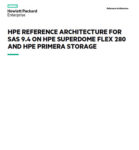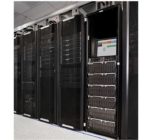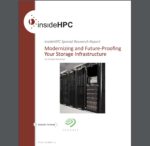New York – September 20, 2023 – AI data platform company VAST Data has named Marianne Budnik chief marketing officer. She will lead all marketing functions including product marketing, field marketing, customer advocacy, communications and public relations, content, creative and brand strategy. Budnik has led marketing organizations for companies including CrowdStrike, CyberArk and CA Technologies, […]
HPE Reference Architecture for SAS 9.4 on HPE Superdome Flex 280 and HPE Primera Storage
This Reference Architecture highlights the key findings and demonstrated scalability when running SAS® 9.4 using the Mixed Analytics Workload running on HPE Superdome Flex 280 Server and HPE Primera Storage. These results demonstrate that the combination of the HPE Superdome Flex 280 Server and HPE Primera Storage with SAS 9.4 delivers up to 20GB/s of sustained throughput, up to a 2x performance improvement from the previous server and storage generation testing.
Qumulo Launches on AWS Outposts for File Storage and Data Management
SEATTLE – Sept. 15, 2020 – Qumulo, a cloud file data platform that helps organizations store and manage file data, today announced availability on AWS Outposts. AWS Outposts is a managed service that extends Amazon Web Services (AWS) infrastructure, AWS services, APIs, and tools to any datacenter, co-location space, or on-premises facility and is designed for […]
Panasas PanFS 8: Architectural Overview
The PanFS® parallel file system delivers the highest performance among competitive HPC storage systems at any capacity, and takes the complexity and unreliability of typical high-performance computing (HPC) storage systems off your hands, and it does so using commodity hardware at competitive price points. In this white paper, we’re going to take a “breadth-first” tour of the architecture of PanFS, looking at its key components then diving deep into the main benefits.











